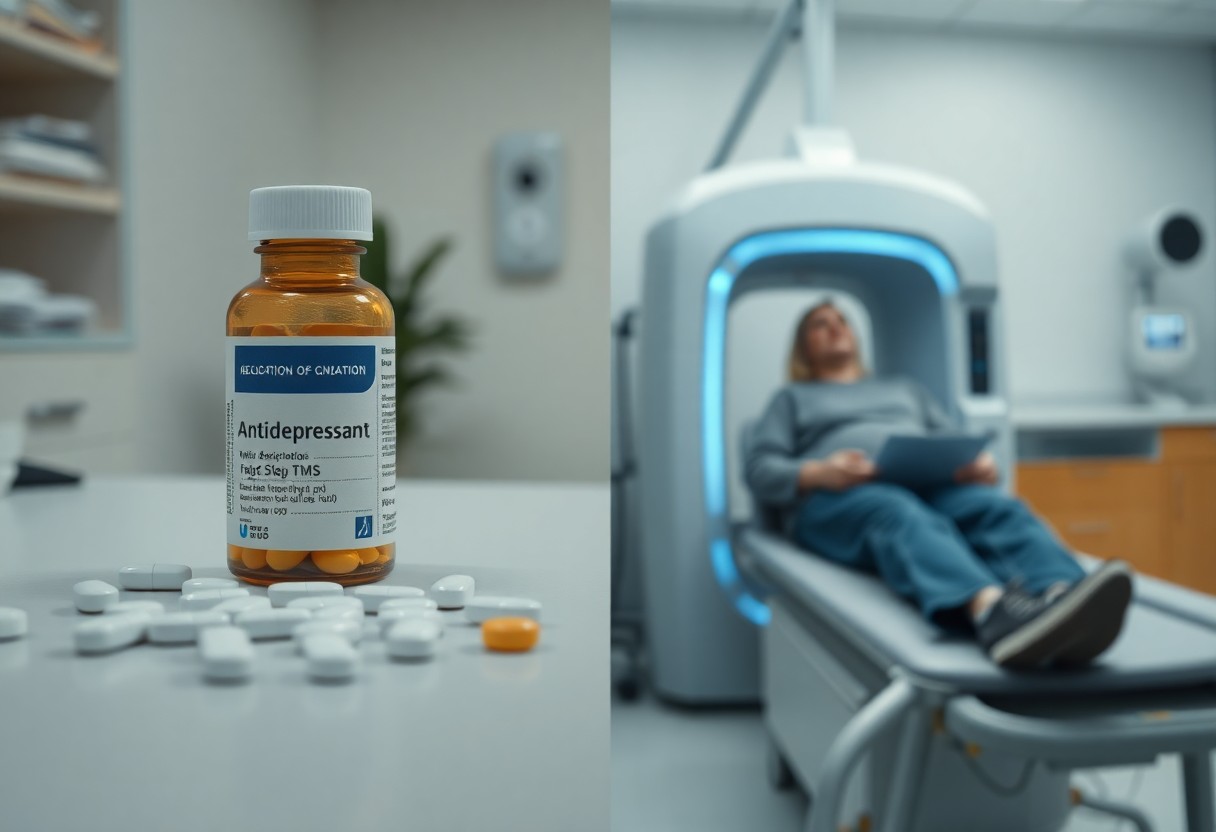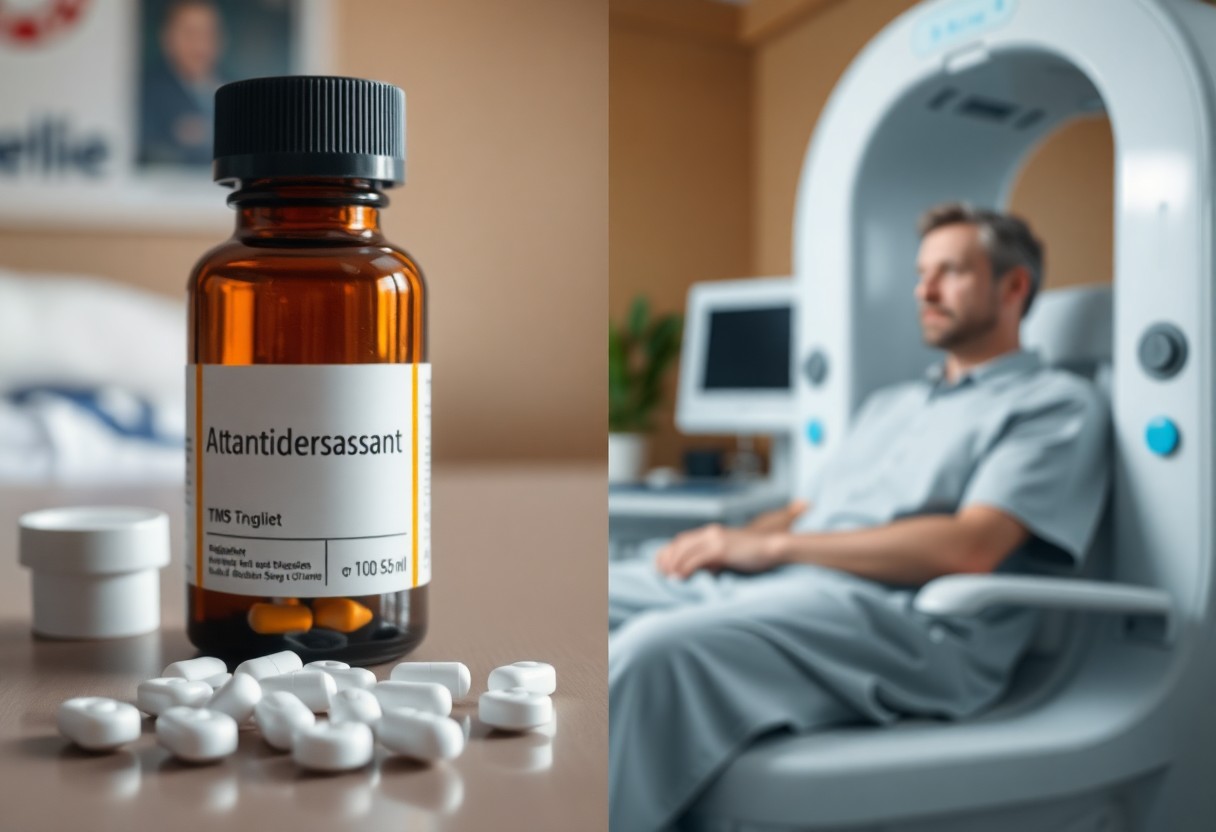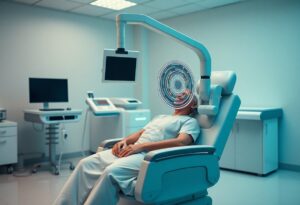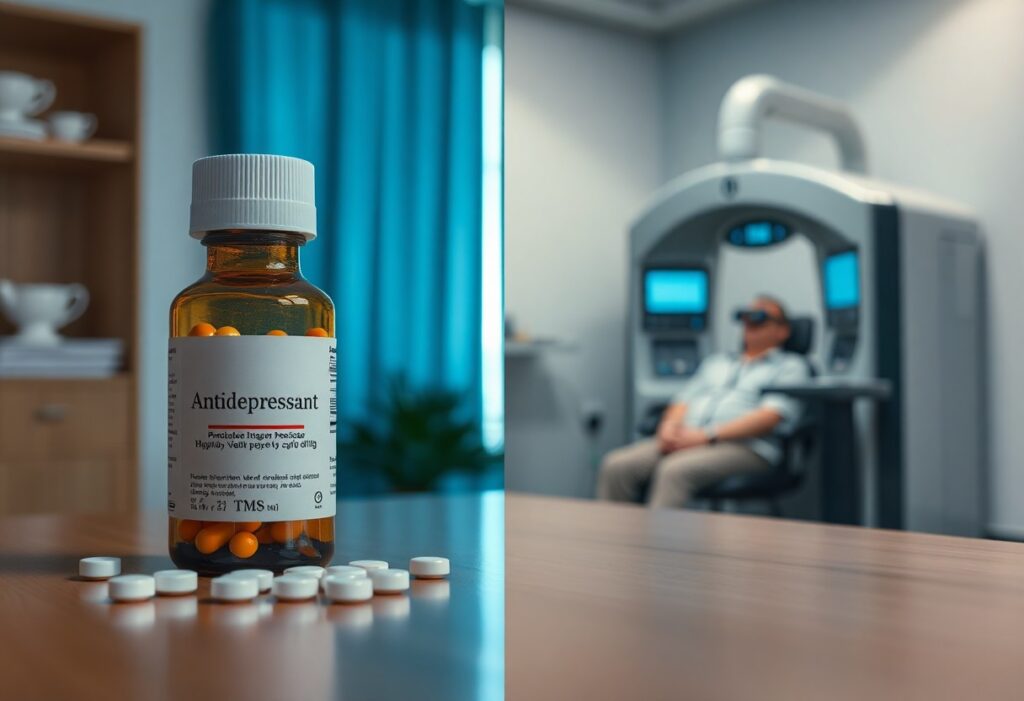Many individuals facing depression often grapple with the decision between Transcranial Magnetic Stimulation (TMS) and traditional medication. With various treatment options available, it’s vital to understand how each approach works and which might be the most effective for your particular situation. In this post, we’ll explore TMS and medication, comparing their benefits, side effects, and overall effectiveness to help you make an informed choice about your mental health treatment journey.
Key Takeaways:
- Efficacy: Transcranial Magnetic Stimulation (TMS) has shown to be effective for treatment-resistant depression, potentially offering a solution where medication fails.
- Side Effects: TMS generally has fewer and less severe side effects compared to traditional antidepressant medications, making it a more tolerable option for some patients.
- Duration of Treatment: Medication typically requires a longer commitment to see results, while TMS may show improvement within a few weeks, allowing for quicker assessment of its effectiveness.
TMS vs. Medication for Depression – Which Works Best?
Definition and Types of Depression
For many, depression is more than just a passing feeling of sadness; it is a serious mental health condition that can impact all areas of your life. There are various types of depression, including major depressive disorder, persistent depressive disorder, bipolar disorder, and seasonal affective disorder. Each type has its unique features and may require different approaches to treatment.
- Major depressive disorder: Characterized by persistent sadness and loss of interest.
- Persistent depressive disorder: A long-term form of depression lasting for at least two years.
- Bipolar disorder: Features mood swings that include emotional highs and lows.
- Seasonal affective disorder: Depressive episodes linked to seasonal changes.
- Postpartum depression: Affects new mothers after childbirth.
After understanding these definitions and types, you may better identify what you or a loved one might be experiencing.
| Type | Description |
|---|---|
| Major Depressive Disorder | Severe symptoms that interfere with daily life. |
| Persistent Depressive Disorder | Chronic low-level depression lasting years. |
| Bipolar Disorder | Includes depressive and manic episodes. |
| Seasonal Affective Disorder | Depression tied to seasonal changes. |
| Postpartum Depression | Affects women after childbirth, marked by severe mood swings. |
Common Symptoms
Any individual dealing with depression may experience a range of symptoms that affect daily functioning. These symptoms can vary in intensity and duration, making it vital to recognize them and seek help when needed.
This includes feelings of deep sadness, fatigue, changes in appetite, difficulty concentrating, and a loss of interest in activities once enjoyed. You may also experience emotional numbness or irritability. Being aware of these symptoms can empower you to take decisive steps towards seeking support and treatment options.
Causes and Risk Factors
About depression often lies in a combination of factors, including biological, environmental, and psychological influences. Understanding these can help you identify potential risks in your own life.
- Genetic predisposition: A family history of depression can increase risk.
- Brain chemistry: Imbalances in neurotransmitters are linked to depression.
- Trauma: Experiencing traumatic events can trigger depressive episodes.
- Chronic illness: Ongoing health conditions may contribute to feelings of helplessness.
- Substance abuse: Problems with drugs and alcohol can exacerbate depression symptoms.
Knowing more about these causes may encourage you to take proactive steps in maintaining your mental health.
- Genetics: Family history of mental health issues can indicate higher risk.
- Environment: Stressful situations, such as job loss or relationship problems, can trigger depression.
- Psychological traits: Low self-esteem or persistent pessimism can factor in.
- Age and Gender: Certain demographics may be at greater risk.
- Life events: Significant life changes or losses can lead to depressive symptoms.
Knowing the multitude of causes and risk factors can assist you in navigating the complexities of depression.
Overview of Treatment Options
Assuming you or someone you know is grappling with depression, understanding the available treatment options is key in making an informed choice. You may feel overwhelmed by the variety of approaches, ranging from traditional medications to newer therapies like Transcranial Magnetic Stimulation (TMS). For a detailed comparison between these methods, you can explore more in our article on Antidepressant Therapy vs. TMS Treatment for Depression.
Medications for Depression
At the forefront of treatment for depression are various medications, primarily antidepressants. These drugs, including SSRIs, SNRIs, and others, work to balance the chemicals in your brain. While they can be effective for many individuals, it typically takes several weeks to feel their full benefits, and side effects could impact your daily life.
Transcranial Magnetic Stimulation (TMS)
Among the newer options for treating depression, TMS has gained attention for its non-invasive nature. This innovative treatment involves using magnetic fields to stimulate nerve cells in your brain, specifically targeting areas that regulate mood. TMS can offer an alternative for those who have not found relief with traditional medications.
Antidepressants may not work for everyone, and side effects can lead to discontinuation. In contrast, TMS is an appealing option as it generally has fewer side effects, and many patients report improvements in symptoms after just a few sessions. This makes TMS a viable treatment path, particularly for individuals seeking alternatives or those who cannot tolerate medication. If you are exploring your options, discussing TMS with your healthcare provider could be an important step towards finding suitable relief from depression.

Effectiveness of Medications
Your understanding of the effectiveness of medications for depression is important in making informed choices for your mental health. Numerous options exist, including SSRIs, SNRIs, and other antidepressants, each designed to adjust neurotransmitter levels in your brain. If you’re curious about the comparative effectiveness of medication versus TMS therapy, you can find a well-researched resource on Medication vs. TMS Therapy for Depression.
Research Studies and Findings
About various research studies conducted over the years has shown that medications can be effective for many individuals suffering from depression. The efficacy often varies according to the type of medication, dosage, and individual patient characteristics. While many report significant improvements, some studies indicate that a notable percentage experience limited benefits or side effects.
Benefits and Limitations
After considering the benefits of medications, it’s apparent they can provide fast relief for many individuals experiencing depression. However, limitations include potential side effects, a risk of dependency, and the fact that not everyone responds positively. Additionally, medication might not address the underlying issues contributing to depression.
Limitations can significantly affect your experience with medication. While some individuals notice improvements within weeks, others may face side effects such as weight gain, fatigue, or changes in sleep patterns. Moreover, finding the right medication often requires patience, as it can take time to identify what works best for you without compounding adverse effects.
Timeframe for Effectiveness
Effectiveness of depression medications can vary in terms of timeframe, as many people may begin experiencing relief within several weeks, while others may take longer. It’s vital to have realistic expectations and understand that optimizing treatment often requires continuous evaluation and communication with your healthcare provider.
In addition to individual variances, the timeframe for effectiveness is influenced by the type of medication, the dosage, and your unique metabolic and physiological responses. Adjustments in medication and regular follow-ups can help you achieve the best possible outcome, but be prepared for a journey that requires persistence and collaboration with your healthcare team.
Effectiveness of TMS
Keep in mind that Transcranial Magnetic Stimulation (TMS) has gained significant attention for its effectiveness in treating depression, particularly for patients who have not responded well to traditional medications.
Research Studies and Findings
After extensive research, numerous clinical studies have demonstrated that TMS can result in notable improvements in depressive symptoms. One large-scale meta-analysis indicates a response rate of about 50% for TMS patients, showcasing its potential as a compelling alternative to conventional therapies.
Benefits and Limitations
Findings regarding TMS highlight both its advantages and limitations. On the one hand, TMS offers a non-invasive option with fewer side effects compared to many antidepressant medications; however, it may not be effective for everyone and requires a series of sessions, which can be a drawback for some individuals.
This underscores the importance of personalized treatment approaches. While TMS is generally well-tolerated and has a relatively low risk of adverse effects, its efficacy can vary from person to person. Additionally, the treatment process is time-consuming, necessitating multiple appointments each week over several weeks, which can be a challenge for those with busy schedules or other commitments.
Timeframe for Effectiveness
Effectiveness of TMS can emerge within a few sessions, although many patients may require a full course of treatment to experience the full benefits.
Also, initial improvements might be noticed as early as two weeks into the therapy, but significant results typically manifest after 4 to 6 weeks. It’s important for you to maintain realistic expectations and consult closely with your healthcare provider throughout the treatment process to assess your progress and adjust your plan as necessary.
Side Effects and Risks
Not every treatment option is devoid of complications. When considering TMS or medication for depression, understanding the side effects and risks inherent to each is important for making an informed choice. As noted in this article on Brain stimulation poised to move from last resort to frontline …, both methods offer unique balances of efficacy and side effects that can impact your treatment journey.
Side Effects of Medications
Above all, medications can come with a range of side effects, including weight gain, nausea, insomnia, and sexual dysfunction. These effects can significantly affect your quality of life and may even discourage ongoing treatment. Thus, it’s important to discuss any concerns with your healthcare provider to tailor your treatment plan.
Side Effects of TMS
Effects associated with TMS are generally milder compared to those of traditional medications. However, they can include scalp discomfort, headaches, or lightheadedness immediately after treatment. While these effects are typically transient, they can influence your willingness to adhere to the TMS schedule.
Side effects from TMS tend to be less severe and resolve quickly, making this option appealing for many. However, it’s important to consult with your healthcare provider to discuss any concerns you might have about these potential effects on your daily life. They can provide insights and strategies to mitigate any discomfort you may experience during treatment.
Long-term Risks
Side effects from both treatment options can have long-term implications. For medications, there may be concerns regarding dependency and withdrawal symptoms upon discontinuation. It is vital to work closely with your healthcare provider to manage these risks effectively.
The long-term risks associated with TMS are relatively low, particularly when compared to medications. Continuous research continues to demonstrate its safety, but understanding individual responses and monitoring over time is crucial. Discuss with your provider how both treatment options can fit into your long-term mental health management without unwanted repercussions.

Comparing TMS and Medications
After exploring the basic principles of Transcranial Magnetic Stimulation (TMS) and traditional medication treatments for depression, it’s important to dive deeper into how these two approaches compare when it comes to efficacy, patient suitability, and cost considerations. Each method has its strengths and limitations, and understanding these can help you make an informed choice about your treatment options.
Comparative Table
| TMS | Medications |
|---|---|
| Non-invasive brain stimulation technique | Includes antidepressants and mood stabilizers |
| Uses electromagnetic fields to stimulate nerve cells | Affects neurotransmitter levels in the brain |
| Generally fewer side effects | Possible side effects, including weight gain and sexual dysfunction |
| May take several sessions to see improvement | Effects may be seen in a few weeks but often require adjustments |
Efficacy Comparison
Across various studies, TMS has shown to be effective for individuals who haven’t responded well to conventional treatments. Research indicates that approximately 50-60% of those who receive TMS experience a significant reduction in depressive symptoms. In contrast, traditional medications may take longer to show results and often require dosage adjustments, which can affect overall efficacy.
Efficacy Table
| TMS | Medications |
|---|---|
| 50-60% effectiveness in treatment-resistant cases | 30-40% effectively manage symptoms |
| Potential for rapid improvement | Delayed response common |
Patient Suitability
At the same time, determining the best treatment option depends on your specific circumstances. TMS might be suitable if you prefer a non-invasive treatment or have had adverse reactions to medications. Conversely, if you are already on a stable medication regimen that somewhat alleviates your symptoms, you might stick with what works for you.
In fact, your individual medical history, the severity of your depression, and your previous treatment responses all play a significant role in deciding whether TMS or medications are a better fit for you. Those with certain neurological conditions may not be ideal candidates for TMS, while others may find medications ineffective or intolerable due to side effects. Personalizing treatment is important for achieving the best outcomes.
Cost Considerations
Below, it’s vital to factor in the cost of both TMS and medication when evaluating which treatment may suit your needs better. TMS often requires multiple sessions over several weeks, leading to higher upfront costs. However, many insurance plans cover it, which can alleviate some financial burden.
Another important aspect is that while traditional medications may seem less expensive initially, the long-term costs can accumulate due to ongoing prescriptions and potential added expenses related to managing side effects. Evaluating your financial situation and insurance coverage will help you weigh the economic implications of both treatments, ultimately leading to a more informed decision about your mental health care.
To wrap up
Hence, understanding the differences between TMS and medication for depression allows you to make an informed decision about your treatment options. While TMS offers a non-invasive alternative with fewer side effects, medication can also be effective for many individuals. Considering your unique situation, personal preferences, and guidance from your healthcare professional will help you determine which approach may work best for your mental health journey.
FAQ
Q: What is TMS and how does it work for treating depression?
A: Transcranial Magnetic Stimulation (TMS) is a non-invasive procedure that uses magnetic fields to stimulate nerve cells in the brain, particularly in areas associated with mood regulation. TMS is believed to enhance neuroplasticity, improve neuronal communication, and increase the production of neurotransmitters, which can help relieve symptoms of depression. Treatments are usually conducted in a doctor’s office and involve short sessions over several weeks.
Q: How does medication for depression typically function?
A: Antidepressant medications primarily work by altering the levels of neurotransmitterssuch as serotonin, norepinephrine, and dopamine in the brain, which play key roles in mood regulation. Different classes of antidepressants include SSRIs, SNRIs, and MAOIs, each with its own mechanism of action. Medication can take several weeks to begin showing effects, and managing dosages and side effects is an important part of treatment.
Q: Are there specific types of depression that TMS is more effective for?
A: TMS has shown effectiveness particularly for major depressive disorder, especially in patients who have not responded well to traditional antidepressant medications. Some studies suggest that TMS might also be beneficial for those with treatment-resistant depression, providing an alternative when standard treatments fail to deliver satisfactory results.
Q: What are the potential side effects of TMS compared to medication?
A: TMS is generally well-tolerated, with side effects primarily including mild headache or scalp discomfort at the stimulation site. These effects are usually transient and resolve quickly. In contrast, some medications can have a wider range of side effects, such as weight gain, sexual dysfunction, fatigue, or gastrointestinal issues. The side effect profiles can vary significantly depending on the type of medication being used.
Q: How do patients decide which treatment option is best for them?
A: The choice between TMS and medication often depends on individual factors, including the severity of depression, previous treatment outcomes, personal preferences, and any potential contraindications. Consulting with a healthcare provider is important to evaluate each patient’s unique situation and to consider factors such as the urgency of treatment, side effects, and personal medical history before making a decision.







